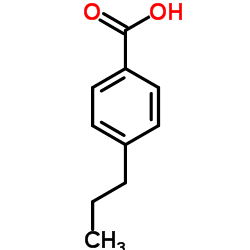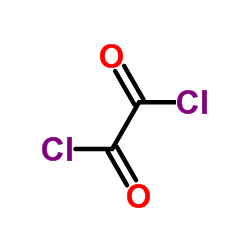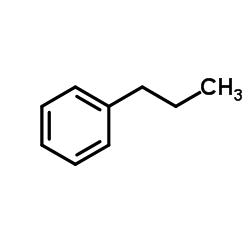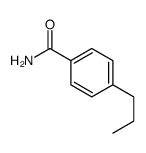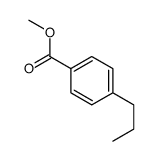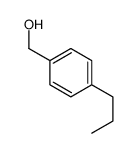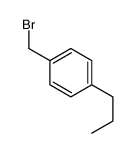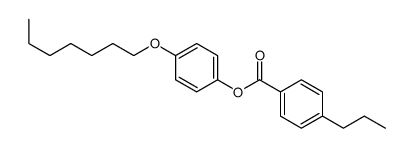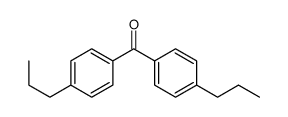52710-27-7
| 中文名 | 4-丙基苯甲酰氯 |
|---|---|
| 英文名 | 4-n-propylbenzoyl chloride |
| 中文别名 |
对丙基苯甲酰氯
4-正丙基苯甲酰氯 |
| 英文别名 |
4-Propylbenzoyl chloride
MFCD00000698 |
| 密度 | 1.097 g/mL at 25 °C(lit.) |
|---|---|
| 沸点 | 135-136 °C20 mm Hg(lit.) |
| 分子式 | C10H11ClO |
| 分子量 | 182.64700 |
| 闪点 | >230 °F |
| 精确质量 | 182.05000 |
| PSA | 17.07000 |
| LogP | 3.01810 |
| 外观性状 | 无色-灰白的有香味的液体 |
| 折射率 | n20/D 1.5394(lit.) |
| 储存条件 | 保持贮藏器密封、储存在阴凉、干燥的地方,确保工作间有良好的通风或排气装置 |
| 稳定性 | 如果遵照规格使用和储存则不会分解,未有已知危险反应 |
| 计算化学 | 1.疏水参数计算参考值(XlogP):无 2.氢键供体数量:0 3.氢键受体数量:1 4.可旋转化学键数量:3 5.互变异构体数量:3 6.拓扑分子极性表面积17.1 7.重原子数量:12 8.表面电荷:0 9.复杂度:148 10.同位素原子数量:0 11.确定原子立构中心数量:0 12.不确定原子立构中心数量:0 13.确定化学键立构中心数量:0 14.不确定化学键立构中心数量:0 15.共价键单元数量:1 |
| 更多 | 1. 性状:液体 2. 密度(g/mL,25ºC):1.097 3. 相对蒸汽密度(g/mL,空气=1): 未确定 4. 熔点(ºC):未确定 5. 沸点(ºC):未确定 6. 沸点(ºC,10mm hg):124-126 7. 折射率:n 20/D 1.5394(lit.) 8. 闪点(°F):>230 9. 比旋光度(ºC):未确定 10. 自燃点或引燃温度(ºC): 未确定 11. 蒸气压(kPa,20ºC):未确定 12. 饱和蒸气压(kPa,60ºC):未确定 13. 燃烧热(KJ/mol):未确定 14. 临界温度(ºC):未确定 15. 临界压力(KPa):未确定 16. 油水(辛醇/水)分配系数的对数值:未确定 17. 爆炸上限(%,V/V):未确定 18. 爆炸下限(%,V/V):未确定 19. 溶解性:与水反应 |
Synonym:None Section 2 - COMPOSITION, INFORMATION ON INGREDIENTS
Risk Phrases: 34 Section 3 - HAZARDS IDENTIFICATION EMERGENCY OVERVIEW
Causes burns.Corrosive. Potential Health Effects Eye: Causes eye burns. Skin: Causes skin burns. Ingestion: May cause severe and permanent damage to the digestive tract. Causes gastrointestinal tract burns. Inhalation: Causes chemical burns to the respiratory tract. Chronic: No information found. Section 4 - FIRST AID MEASURES Eyes: Get medical aid immediately. Do NOT allow victim to rub eyes or keep eyes closed. Extensive irrigation with water is required (at least 30 minutes). Skin: Get medical aid immediately. Immediately flush skin with plenty of water for at least 15 minutes while removing contaminated clothing and shoes. Wash clothing before reuse. Destroy contaminated shoes. Ingestion: Do not induce vomiting. If victim is conscious and alert, give 2-4 cupfuls of milk or water. Get medical aid immediately. Inhalation: Get medical aid immediately. Remove from exposure and move to fresh air immediately. If not breathing, give artificial respiration. If breathing is difficult, give oxygen. Do NOT use mouth-to-mouth resuscitation. If breathing has ceased apply artificial respiration using oxygen and a suitable mechanical device such as a bag and a mask. Notes to Physician: Section 5 - FIRE FIGHTING MEASURES General Information: As in any fire, wear a self-contained breathing apparatus in pressure-demand, MSHA/NIOSH (approved or equivalent), and full protective gear. During a fire, irritating and highly toxic gases may be generated by thermal decomposition or combustion. Use water spray to keep fire-exposed containers cool. Vapors may be heavier than air. They can spread along the ground and collect in low or confined areas. Containers may explode when heated. Extinguishing Media: Use agent most appropriate to extinguish fire. Cool containers with flooding quantities of water until well after fire is out. Use water spray, dry chemical, carbon dioxide, or alcohol-resistant foam. Section 6 - ACCIDENTAL RELEASE MEASURES General Information: Use proper personal protective equipment as indicated in Section 8. Spills/Leaks: Absorb spill with inert material (e.g. vermiculite, sand or earth), then place in suitable container. Avoid runoff into storm sewers and ditches which lead to waterways. Clean up spills immediately, observing precautions in the Protective Equipment section. Remove all sources of ignition. Provide ventilation. Section 7 - HANDLING and STORAGE Handling: Wash thoroughly after handling. Remove contaminated clothing and wash before reuse. Avoid contact with eyes, skin, and clothing. Keep container tightly closed. Do not ingest or inhale. Use with adequate ventilation. Discard contaminated shoes. Storage: Store in a cool, dry place. Keep container closed when not in use. Corrosives area. Section 8 - EXPOSURE CONTROLS, PERSONAL PROTECTION Engineering Controls: Facilities storing or utilizing this material should be equipped with an eyewash facility and a safety shower. Use adequate ventilation to keep airborne concentrations low. Exposure Limits CAS# 52710-27-7: Personal Protective Equipment Eyes: Wear appropriate protective eyeglasses or chemical safety goggles as described by OSHA's eye and face protection regulations in 29 CFR 1910.133 or European Standard EN166. Skin: Wear appropriate protective gloves to prevent skin exposure. Clothing: Wear appropriate protective clothing to minimize contact with skin. Respirators: A respiratory protection program that meets OSHA's 29 CFR 1910.134 and ANSI Z88.2 requirements or European Standard EN 149 must be followed whenever workplace conditions warrant respirator use. Section 9 - PHYSICAL AND CHEMICAL PROPERTIES Physical State: Liquid Color: pale-yellow Odor: none reported pH: Not available. Vapor Pressure: Not available. Viscosity: Not available. Boiling Point: 125 deg C @ 9.00mm Hg Freezing/Melting Point: Not available. Autoignition Temperature: Not available. Flash Point: > 121 deg C (> 249.80 deg F) Explosion Limits, lower: Not available. Explosion Limits, upper: Not available. Decomposition Temperature: Solubility in water: Specific Gravity/Density: 1.0970g/cm3 Molecular Formula: C10H11ClO Molecular Weight: 182.65 Section 10 - STABILITY AND REACTIVITY Chemical Stability: Stable under normal temperatures and pressures. Conditions to Avoid: Incompatible materials, ignition sources, excess heat, strong oxidants. Incompatibilities with Other Materials: Alcohols, strong bases, strong oxidizing agents. Hazardous Decomposition Products: Hydrogen chloride, carbon monoxide, irritating and toxic fumes and gases, carbon dioxide, phosgene gas. Hazardous Polymerization: Has not been reported Section 11 - TOXICOLOGICAL INFORMATION RTECS#: CAS# 52710-27-7 unlisted. LD50/LC50: Not available. Carcinogenicity: Benzoyl Chloride, 4-Propyl- - Not listed by ACGIH, IARC, or NTP. Section 12 - ECOLOGICAL INFORMATION Section 13 - DISPOSAL CONSIDERATIONS Dispose of in a manner consistent with federal, state, and local regulations. Section 14 - TRANSPORT INFORMATION IATA Shipping Name: CORROSIVE LIQUID, ACIDIC, ORGANIC, N.O.S.* Hazard Class: 8 UN Number: 3265 Packing Group: III IMO Shipping Name: CORROSIVE LIQUID, ACIDIC, ORGANIC, N.O.S. Hazard Class: 8 UN Number: 3265 Packing Group: III RID/ADR Shipping Name: CORROSIVE LIQUID, ACIDIC, ORGANIC, N.O.S. Hazard Class: 8 UN Number: 3265 Packing group: III Section 15 - REGULATORY INFORMATION European/International Regulations European Labeling in Accordance with EC Directives Hazard Symbols: C Risk Phrases: R 34 Causes burns. Safety Phrases: S 25 Avoid contact with eyes. S 28 After contact with skin, wash immediately with... S 36/37/39 Wear suitable protective clothing, gloves and eye/face protection. WGK (Water Danger/Protection) CAS# 52710-27-7: No information available. Canada CAS# 52710-27-7 is listed on Canada's NDSL List. CAS# 52710-27-7 is not listed on Canada's Ingredient Disclosure List. US FEDERAL TSCA CAS# 52710-27-7 is listed on the TSCA inventory. SECTION 16 - ADDITIONAL INFORMATION N/A |
|
生态学数据: 对水是稍微有危害的不要让未稀释或大量的产品接触地下水、水道或者污水系统,若无政府许可,勿将材料排入周围环境。
|
| 危害码 (欧洲) | C,Xi |
|---|---|
| 风险声明 (欧洲) | 34-36/37 |
| 安全声明 (欧洲) | S26-S27-S28-S36/37/39-S45 |
| 危险品运输编码 | UN 3265 8/PG 2 |
| WGK德国 | 3 |
| 包装等级 | II |
| 危险类别 | 8 |
| 海关编码 | 2916399090 |
| 上游产品 3 | |
|---|---|
| 下游产品 10 | |
| 海关编码 | 2916399090 |
|---|---|
| 中文概述 | 2916399090 其他芳香一元羧酸. 增值税率:17.0% 退税率:9.0% 监管条件:无 最惠国关税:6.5% 普通关税:30.0% |
| 申报要素 | 品名, 成分含量, 用途, 丙烯酸、丙烯酸盐或酯应报明包装 |
| Summary | 2916399090 other aromatic monocarboxylic acids, their anhydrides, halides, peroxides, peroxyacids and their derivatives VAT:17.0% Tax rebate rate:9.0% Supervision conditions:none MFN tariff:6.5% General tariff:30.0% |



